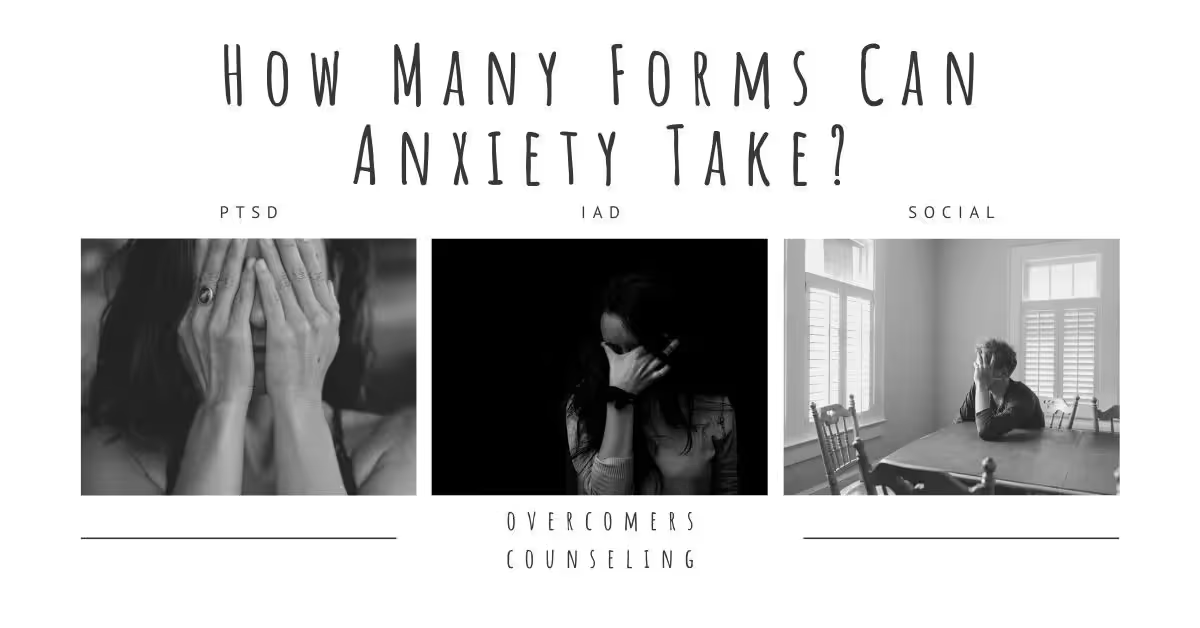Anxiety can take many forms. Anxiety is a normal emotion to experience. Anxiety is a powerful source of motivation. When we experience it at a low level, we...

Anxiety can take many forms. Anxiety is a normal emotion to experience. Anxiety is a powerful source of motivation. When we experience it at a low level, we are motivated to act. Action reduces anxiety.
When anxiety reaches levels that are too high, it can leave us unable to act.
This is the Yerkes-Dodson Law of psychology (Cohen, 2011).
A certain level of arousal will improve our performance. Too high an arousal level will impair our performance. When high is experienced at a high level and on a long term basis, it can be defined as a psychological disorder. This level of anxiety is maladaptive, and results in dysfunction and distress and impairment. Here is an overview of anxiety disorders.
“You wouldn’t worry so much about what others think of you if you realized how seldom they do.”
Eleanor Roosevelt
Treatment Options For Anxiety
The good news about anxiety disorders is that they are very treatable. Anxiety disorders are well managed through:
CBT (Cognitive Behavioral Therapy): CBT is very effective for managing anxiety. CBT is rooted in the philosophy of stoicism. The basic premise of both the treatment method and philosophy is that it is not objective reality which is distressing; it is our subjective interpretation of that reality which can be distressing or not (IQWIG, 2016).
SSRI's (Selective Serotonin Re-Uptake Inhibitors):This is a class of medications that all work similarly, by increasing the availability of Serotonin. Serotonin is a neurotransmitter, or biochemical which is involved with communication between nerve cells. Low levels of serotonin are implicated in anxiety, as well as depression (National Health Services, 2018).
Lifestyle changes
This is where you will do the work. CBT works well to manage anxiety. SSRI's work well. Combining CBT with an SSRI is even more effective. The other very important element is to look at your day to day behaviors, and make adjustments which are conducive to anxiety reduction.
The bottom line is anxiety comes in many forms, and can be overwhelming. There are effective treatments available.
American Psychiatric Association. (2017). What Are Anxiety Disorders? American Psychiatric Association. Retrieved April 5, 2020 from https://www.psychiatry.org/patients-families/anxiety-disorders/what-are-anxiety-disorders
Cherry, K. (2019). A to Z: Strange and Common List of Phobias. verywellmind. Retrieved April 5, 2020 from https://www.verywellmind.com/list-of-phobias-2795453
Cohen R.A. (2011) Yerkes–Dodson Law. In: Kreutzer J.S., DeLuca J., Caplan B. (eds) Encyclopedia of Clinical Neuropsychology. Springer, New York, NY
IQWIG. (2016). Cognitive behavioral therapy. NCBI Bookshelf. Retrieved April 5, 2020 from https://www.ncbi.nlm.nih.gov/books/NBK279297/
Jocko Willink. (2018). Stand up Straight and Be Competent - Jocko Willink and Jordan Peterson . Retrieved April 5, 2020 from https://www.youtube.com/watch?v=MC2uiA4z32M
National Health Services. (2018). Overview - Selective serotonin reuptake inhibitors (SSRIs) Retrieved April 5, 2020 from https://www.nhs.uk/conditions/ssri-antidepressants/
Porter, D.A. (2014a) Illness Anxiety Disorder DSM-5 300.7 (F45.21). Theravive. Retrieved April 5, 2020 from https://www.theravive.com/therapedia/illness-anxiety-disorder-dsm--5-300.7-(f45.21)
Porter, D.A. (2014b). Journal Writing as a Therapeutic Tool. Theravive. Retrieved April 5, 2020 from https://www.theravive.com/today/post/journal-writing-as-a-therapeutic-tool-0001727.aspx
Porter, D.A. (2014c) Managing Your Mood with Exercise. Theravive. Retrieved April 5, 2020 from https://www.theravive.com/today/post/managing-your-mood-with-exercise-0001725.aspx
Porter, D.A. (2014d) Social Anxiety Disorder (Social Phobia) DSM-5 300.23 (F40.10)Theravive. Retrieved April 5, 2020 from https://www.theravive.com/therapedia/illness-anxiety-disorder-dsm--5-300.7-(f45.21)
The duration of anxiety counseling varies for each individual, depending on the severity of their anxiety and their progress in therapy. Our therapists will regularly assess your progress and adjust your treatment plan as needed.
Yes, Medicaid provides insurance coverage for therapy services specifically designed to help individuals struggling with anxiety, depression, and other mental health conditions.
Ignoring anxiety can exacerbate symptoms and make it more challenging to manage over time. This can result in a negative impact on your personal, professional, and social life, leading to feelings of isolation and even depression.
Addressing anxiety is crucial because it can significantly impact your quality of life and overall well-being. Left untreated, anxiety can lead to more severe mental health issues, relationship problems, and difficulty functioning in daily life.
To reduce your anxiety, you can practice relaxation techniques such as deep breathing, progressive muscle relaxation, guided imagery, and mindfulness practices. Additionally, regular exercise has been found to be beneficial in managing stress and improving mental health.
It's important that you feel comfortable discussing personal matters with your therapist in order to open up and get more out of therapy sessions; therefore finding someone who meets certain criteria like experience level, expertise areas, and personality is key when selecting a therapist who can give meaningful feedback about how best handle issues related to anxiety or other mental health concerns.